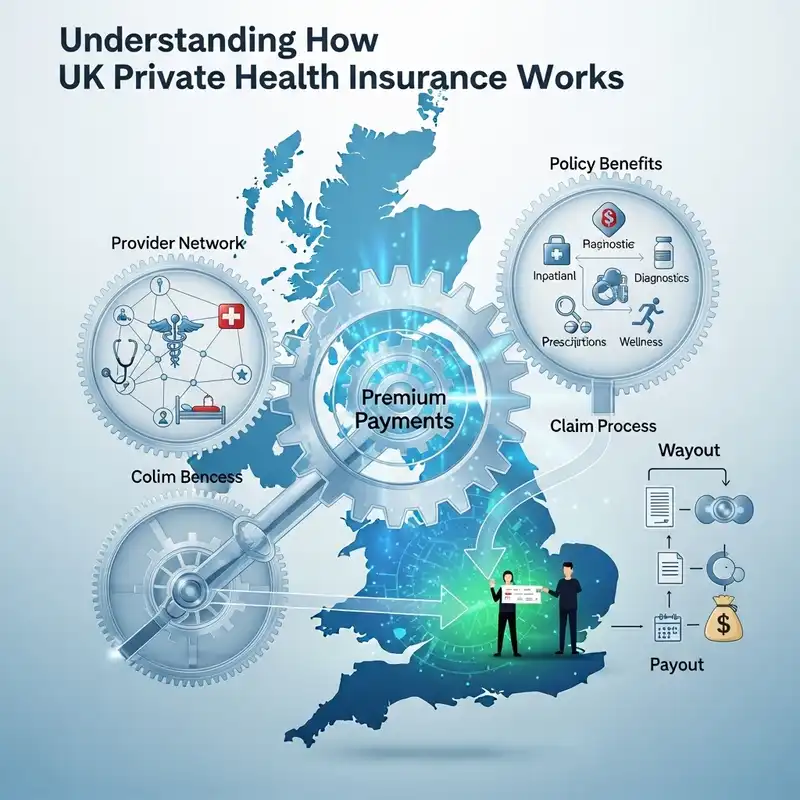Executive Health Checks: UK Private Health Insurance

A Deep Dive into Preventative Care: Why UK Private Health Insurance is Essential for Executive Well-being
UK Private Health Insurance Executive Health Checks – A Deep Dive into Preventative Cover
In today's fast-paced world, where deadlines loom, stress levels rise, and personal time often takes a backseat, it's easy to overlook one of our most valuable assets: our health. Yet, proactive health management isn't just a luxury; it's a vital investment in our long-term well-being, productivity, and peace of mind. This is where the concept of executive health checks, often facilitated by private medical insurance, truly shines.
Far beyond a routine GP visit, an executive health check offers a comprehensive, in-depth assessment of your current health status, designed to detect potential issues before they escalate into serious concerns. It's a cornerstone of preventative healthcare, empowering individuals to take control of their health narrative. For busy professionals and discerning individuals in the UK, these checks are increasingly becoming a non-negotiable part of their annual health strategy.
This exhaustive guide will delve into the world of UK private health insurance executive health checks. We'll explore what they entail, why they are so crucial, how they differ from standard NHS provisions, and, most importantly, how private medical insurance (PMI) can provide seamless access to these invaluable preventative services. By the end, you'll have a clear understanding of the profound benefits of integrating executive health checks into your health and wellness strategy.
The Philosophy Behind Preventative Healthcare
The traditional healthcare model often focuses on reacting to illness once symptoms manifest. However, a significant shift is underway, emphasising proactive, preventative measures to maintain health and prevent disease. This paradigm shift recognises that catching potential health issues early, or even preventing them altogether through lifestyle adjustments, is far more effective and less costly – both in terms of finances and personal suffering – than treating advanced conditions.
Preventative healthcare, at its core, is about investing in your future health. It’s about understanding your body, identifying risk factors, and implementing strategies to mitigate those risks. For individuals, this means a higher quality of life, increased longevity, reduced anxiety about health, and the ability to continue pursuing passions and careers without the debilitating interruption of unforeseen illness.
For businesses, especially those reliant on key personnel, promoting preventative health through executive health checks translates directly into tangible benefits. Reduced absenteeism due to illness, increased productivity from a healthier workforce, improved morale, and enhanced employee retention are just some of the dividends reaped from a proactive approach to well-being. It's a strategic move that benefits both the individual and the organisation.
What Exactly is an Executive Health Check?
An executive health check is a much more comprehensive and personalised assessment than a standard annual check-up with your general practitioner. It's typically a half-day or full-day experience at a dedicated private clinic, equipped with state-of-the-art diagnostic tools and staffed by a multidisciplinary team of healthcare professionals. The goal is to provide a holistic view of your health, covering various bodily systems and lifestyle factors.
While the exact components can vary slightly between providers and the level of check-up chosen, most executive health checks will include a thorough physical examination and a battery of sophisticated tests.
Typical components often include:
- Comprehensive Medical History Review: Detailed discussion of past medical conditions, family history, and current symptoms.
- Physical Examination: Head-to-toe assessment by a doctor, including eyes, ears, nose, throat, abdomen, reflexes, and skin.
- Blood Tests:
- Full blood count (checking for anaemia, infection, inflammation)
- Cholesterol profile (HDL, LDL, triglycerides)
- Blood glucose (checking for diabetes or pre-diabetes)
- Liver and kidney function tests
- Thyroid function tests
- Prostate-specific antigen (PSA) for men (screening for prostate issues)
- Vitamin levels (e.g., Vitamin D, B12)
- Inflammatory markers
- Urine Analysis: Checking for kidney issues, diabetes, or infections.
- Cardiovascular Assessment:
- Blood pressure measurement
- Electrocardiogram (ECG) to assess heart rhythm and electrical activity
- Optional: Treadmill stress test (exercise ECG) for more in-depth cardiac evaluation
- Lung Function Tests (Spirometry): Measuring how well your lungs are working.
- Body Composition Analysis: Beyond just BMI, assessing body fat percentage, muscle mass, and waist-to-hip ratio.
- Lifestyle Assessment: Detailed discussion on diet, exercise habits, sleep patterns, stress levels, alcohol consumption, and smoking.
- Report and Consultation: A comprehensive report of all findings, followed by a one-on-one consultation with a doctor to discuss results, interpret implications, and develop a personalised action plan for health improvement.
Optional and Advanced Modules:
Many providers offer additional tests and specialist consultations, often available as upgrades or part of more premium executive health check packages. These can include:
- Advanced imaging (e.g., MRI scans for full body or specific areas, CT scans)
- Specialist referrals (e.g., dermatology for mole checks, gynaecology for women's health, cardiology for heart specialists, ophthalmology)
- Specific cancer screenings (e.g., bowel cancer screening, cervical screening for women)
- Fitness assessments and personalised exercise prescriptions
- Dietary analysis and nutritional counselling
- Mental well-being assessment and stress management strategies
The key differentiator from NHS checks is the depth, speed, convenience, and highly personalised attention. While the NHS offers excellent care for diagnosed conditions and essential preventative screenings, executive health checks provide a far more detailed and immediate insight into your current health status, often detecting subtle changes long before they would trigger an NHS referral.
Table 1: Typical Components of an Executive Health Check
| Category | Standard Inclusions | Common Add-ons/Upgrades |
|---|---|---|
| Consultation | Detailed medical history, physical examination, results review | Specialist consultations (e.g., cardiology, dermatology) |
| Blood Tests | Full blood count, cholesterol, glucose, liver & kidney function, thyroid, PSA (men) | Vitamin D, B12, inflammatory markers, advanced hormonal panels, genetic predisposition tests |
| Urine Tests | Urinalysis (basic) | Specific pathogen screening |
| Cardiovascular | Blood pressure, resting ECG | Exercise ECG (Treadmill Test), advanced heart scans (e.g., calcium scoring) |
| Respiratory | Spirometry (lung function) | Chest X-ray (if indicated) |
| Body Composition | BMI, weight, height, waist circumference | Advanced body fat analysis (e.g., DEXA scan) |
| Lifestyle | Discussion on diet, exercise, sleep, stress | Personalised nutrition plans, fitness coaching, stress management workshops |
| Screenings | Specific cancer screenings (e.g., bowel, breast, cervical), bone density (DEXA) | |
| Imaging | MRI (whole body, specific areas), CT scans |
The Link Between Executive Health Checks and Private Medical Insurance
Many individuals might assume that executive health checks are an entirely separate, self-funded expense. While they can certainly be paid for privately, a significant number of private medical insurance (PMI) policies in the UK now incorporate preventative health benefits, including executive health checks, as part of their offering or as an optional add-on.
It's crucial to understand that not all PMI policies are created equal regarding preventative care. Some entry-level policies might focus solely on covering treatment for acute conditions. However, a growing trend among leading insurers is to recognise the value of prevention. They often include an annual health check allowance, access to specific health assessment centres, or a comprehensive executive health check as a standard feature or a highly recommended upgrade.
How the benefit is typically structured:
- Annual Allowance: Your policy might provide a monetary allowance (e.g., £500-£1,000) that can be used towards an annual health check at an approved provider.
- Specific Provider Networks: Insurers often have partnerships with major private health providers like Nuffield Health, Spire Healthcare, Bupa Cromwell Hospital, or directly with smaller, specialised clinics that offer these checks.
- Pre-defined Packages: Some policies might specify the exact level of health check covered (e.g., "Essential Health Assessment" or "Comprehensive Executive Check").
- Optional Add-on: For certain policies, you might need to select an "outpatient care" or "wellness" module to unlock access to these benefits.
A vital point to remember is that private medical insurance primarily covers the diagnosis and treatment of new, acute conditions. Executive health checks fall under the 'diagnosis' umbrella, aiming to detect potential health issues early. However, PMI policies do not cover conditions that are pre-existing (i.e., you had symptoms, received treatment, or sought advice for before taking out the policy) or chronic (long-term, ongoing conditions like diabetes, asthma, or high blood pressure). The health check helps identify these, but ongoing management or treatment for a pre-existing or chronic condition would typically fall outside the scope of your PMI. The policy would cover new conditions discovered, provided they are not pre-existing.
Benefits of Including Executive Health Checks in Your PMI
Integrating executive health checks into your private medical insurance offers a multitude of advantages, extending beyond simple convenience.
- Unparalleled Peace of Mind: Knowing you've had a thorough review of your health can significantly reduce anxiety about unseen health issues. It offers a clear snapshot of your current well-being.
- Early Detection, Better Outcomes: This is perhaps the most significant benefit. Many serious conditions, such as heart disease, certain cancers, or diabetes, can develop silently in their early stages. Executive health checks are designed to flag potential markers or early indicators, allowing for timely intervention, lifestyle modifications, or further investigation. Early detection often leads to simpler, more effective, and less invasive treatments, vastly improving prognosis.
- Personalised Health Insights: You receive a detailed report and a one-on-one consultation with a doctor who can explain complex medical information in an understandable way. This often includes tailored recommendations for diet, exercise, stress management, and preventative screenings based on your unique risk profile.
- Motivation for Lifestyle Changes: The detailed feedback from a health check, coupled with expert advice, can be a powerful motivator for making positive lifestyle adjustments. Seeing your cholesterol levels or blood pressure readings might be the push you need to start exercising regularly or improve your diet.
- Convenience and Efficiency: Unlike navigating the sometimes lengthy waiting lists or fragmented appointments of the public system, private executive health checks are streamlined. You book a single appointment, often at a time that suits your busy schedule, and all tests are conducted efficiently in one location, with results discussed on the same day or shortly thereafter.
- Access to Private Specialists: Should your health check identify an area requiring further investigation, your PMI policy may then facilitate rapid access to specialist consultants for diagnosis and treatment of new conditions. This swift pathway can be invaluable.
- Enhanced Employee Well-being and Productivity (for Corporate Policies): For businesses, providing these checks through corporate PMI demonstrates a strong commitment to employee welfare. This can boost morale, reduce presenteeism (being at work but unwell and unproductive), and lower absenteeism, ultimately contributing to a healthier, more engaged, and productive workforce.
Who Benefits Most from Executive Health Checks?
While anyone can benefit from a comprehensive health assessment, certain groups stand to gain particular value from executive health checks:
- Busy Professionals and Executives: Individuals in demanding roles often face high stress levels, long working hours, and may neglect their health. Executive health checks offer a structured, efficient way to monitor their well-being.
- Individuals with a Family History of Disease: If there's a history of heart disease, cancer, diabetes, or other conditions in your family, a health check can help identify early risk factors and allow for proactive management.
- Those Approaching Middle Age (35+): As we age, the risk of developing certain conditions increases. Regular checks from your late 30s onwards can be instrumental in identifying and managing age-related health changes.
- Individuals Concerned About Specific Health Risks: If you have particular worries about your health, perhaps due to lifestyle choices (e.g., smoking, sedentary lifestyle) or persistent symptoms you're unsure about, a comprehensive check can provide clarity and peace of mind.
- Companies Investing in Employee Health: Businesses looking to foster a culture of well-being, reduce health-related costs, and retain top talent will find corporate executive health programmes a valuable investment.
Choosing the Right PMI Policy for Preventative Care
Navigating the private medical insurance market can be complex, especially when seeking specific benefits like executive health checks. It's not just about finding the cheapest policy; it's about finding the right policy that aligns with your health goals and budget.
Key considerations when looking for a PMI policy that includes health checks:
- Is it Standard or an Add-on? Determine if executive health checks are automatically included in the core policy or if you need to select an additional module (often called 'Outpatient', 'Wellness', or 'Preventative Care') to access this benefit.
- Level of Cover: Understand what 'level' of health check is covered. Is it a basic health screen, or a comprehensive executive assessment with advanced diagnostics? What specific tests are included?
- Frequency and Limits: How often can you have a health check (typically annually)? Is there a maximum monetary limit on the cost of the check-up?
- Approved Providers: Which health assessment centres or clinics can you use? Ensure these are conveniently located for you and have a good reputation. Major providers like Bupa, Nuffield Health, and Spire often have their own assessment centres.
- Excess and Co-payment: What excess (the amount you pay towards a claim) applies to this benefit? Are there any co-payments required?
- Follow-up Cover: Critically, if the health check detects a new condition, does your policy cover the subsequent diagnostic tests, specialist consultations, and treatment? This is where the core value of PMI truly shines, ensuring a seamless pathway from detection to treatment for new, acute conditions.
- Underwriting Method: Understand how your policy is underwritten (e.g., Moratorium, Full Medical Underwriting). This impacts how pre-existing conditions are handled – remember, health checks are for new conditions, but understanding your underwriting is key for overall policy clarity.
Comparing policies from various insurers can be time-consuming and confusing. This is where WeCovr comes in. We specialise in helping individuals and businesses navigate the complex landscape of UK health insurance. We work with all major UK insurers, offering unbiased advice and comprehensive comparisons to ensure you find a policy that not only fits your budget but also provides the specific preventative benefits, like executive health checks, that are important to you. Our service is entirely free, ensuring you get the best coverage without any added cost.
Table 2: Key Considerations When Choosing a PMI Policy for Health Checks
| Consideration | What to Ask/Check | Importance |
|---|---|---|
| Inclusion Type | Is it standard or an optional add-on (e.g., Wellness module)? | Determines basic cost and availability. |
| Scope of Check | What specific tests are included (basic, comprehensive, advanced)? | Ensures the depth of assessment meets your needs. |
| Frequency & Limit | How often can I have one? What is the monetary allowance? | Ensures you can benefit regularly and fully. |
| Provider Network | Which clinics/hospitals are approved for health checks? | Convenience of location and quality of facility. |
| Excess/Co-payment | What out-of-pocket costs apply to the health check benefit? | Impacts the true cost of accessing the benefit. |
| Follow-up Cover | Does the policy cover diagnostic tests and treatment if a new issue is found? | Crucial for seamless care pathway from detection to treatment. |
| Overall Policy Cover | Does the core policy meet my broader medical needs? | Executive checks are a benefit; core cover is paramount. |
What Happens During an Executive Health Check? A Step-by-Step Guide
Understanding the process can demystify the experience and help you prepare. While specifics may vary, a typical executive health check follows a general flow:
- Booking the Appointment: Once your PMI policy confirms cover (or you're self-paying), you'll contact an approved health assessment centre to schedule your check-up. They will advise on available dates and times.
- Pre-Check-up Instructions: You'll usually receive instructions via email or post. This often includes:
- Fasting: You may need to fast for a certain number of hours (e.g., 8-12 hours) before your blood tests.
- Hydration: Advised to drink plenty of water.
- Medications: Instructions on whether to take regular medications.
- Questionnaire: A detailed health questionnaire to complete beforehand, covering your medical history, family history, lifestyle, and current concerns.
- Arrival at the Clinic: On the day, you'll arrive at the private health assessment centre. These are typically comfortable, modern environments designed to be stress-free. You'll be welcomed and complete any final paperwork.
- Initial Consultations and Tests: You'll be guided through a series of stations or appointments:
- Nurse Assessment: Initial measurements (height, weight, blood pressure), body composition analysis, and collection of blood and urine samples. This is also where any ECG or lung function tests might be conducted.
- Doctor's Consultation & Physical Exam: A dedicated appointment with a doctor. They will review your questionnaire, discuss your health concerns, family history, and conduct a thorough physical examination. This is your opportunity to ask questions.
- Optional Tests/Specialists: If your package includes them, you might move on to specialist consultations (e.g., dermatologist for mole checks) or advanced imaging.
- Post-Check-up Consultation (Results Discussion): Critically, after your tests are complete, you will typically have a dedicated session with the doctor (sometimes the same day, or a few days later for more complex results). They will explain all your results, highlight any areas of concern, discuss your risk factors, and provide personalised recommendations for lifestyle changes or further action.
- Comprehensive Report and Action Plan: You'll receive a detailed written report summarising all your findings, results, and the doctor's recommendations. This often includes a clear action plan to help you implement changes and monitor your health moving forward.
Real-life example: Sarah, a 45-year-old marketing director, opted for an executive health check through her corporate PMI. She felt generally well but had a family history of heart disease. During her check, her blood tests showed slightly elevated cholesterol and blood pressure readings that, while not immediately critical, were trending upwards. The doctor advised specific dietary changes, increased physical activity, and a plan to re-test in six months. This early detection allowed Sarah to make proactive changes, potentially preventing the need for medication or more serious interventions down the line. Without the comprehensive check, these subtle indicators might have gone unnoticed until they became a more significant problem.
Understanding the Limitations and What Isn't Covered
While executive health checks are immensely valuable, it's crucial to have a realistic understanding of their limitations and what your private medical insurance typically does not cover.
The most critical distinction, as mentioned before, is that private medical insurance does not cover pre-existing conditions (any illness, injury, or symptom you had before taking out the policy) or chronic conditions (long-term, ongoing conditions like diabetes, asthma, high blood pressure, or autoimmune diseases). Executive health checks are designed to detect potential health issues, or identify risk factors for new conditions. If an executive health check reveals a pre-existing condition, your PMI policy will not cover its ongoing management or treatment. It would, however, cover the costs of diagnosing a new acute condition found during the check, provided it's not a pre-existing condition.
Other common exclusions or limitations to be aware of:
- Not All Conditions are Detectable Early: While comprehensive, no health check can detect every single possible condition. Some diseases may not present detectable markers or symptoms in their early stages.
- False Positives/Negatives: Like all medical tests, there's a possibility of false positive results (indicating a problem that isn't there) or false negatives (missing a problem that is present). Further diagnostic tests are often needed to confirm any suspicious findings.
- Cosmetic Procedures: Any procedures solely for cosmetic purposes are typically excluded.
- Fertility Treatment: Issues related to fertility or conception are generally not covered.
- Normal Pregnancy & Childbirth: While complications of pregnancy may be covered, routine maternity care is usually excluded.
- Drug and Alcohol Abuse Treatment: Treatment for addiction is often excluded or covered only under very specific, limited circumstances.
- Palliative Care/Long-Term Care: PMI is for acute, curable conditions, not for long-term care or end-of-life care.
- Routine Dental/Optical Care: These are usually separate insurance policies.
- Unapproved Treatments/Experimental Drugs: Treatments not approved by regulatory bodies are excluded.
Always read your policy terms and conditions carefully to understand the full scope of your coverage, including any specific exclusions related to preventative health benefits.
Table 3: Common PMI Exclusions (Relevant to Health Checks if Follow-up is Needed)
| Exclusion Category | Examples | Relevance to Health Checks |
|---|---|---|
| Pre-existing Conditions | Diabetes, asthma, high blood pressure, depression (if symptomatic before policy) | If a health check flags a condition you had prior, subsequent treatment is not covered. |
| Chronic Conditions | Ongoing management of heart disease, autoimmune disorders | PMI covers diagnosis, but not long-term management once diagnosed as chronic. |
| Normal Pregnancy | Routine maternity care, childbirth | PMI focuses on complications, not standard pregnancy. |
| Cosmetic Procedures | Non-medical aesthetic surgeries | Health checks focus on medical necessity. |
| Infertility Treatment | IVF, fertility investigations | Generally separate from core PMI. |
| Self-Inflicted Injury | Injuries sustained due to drug/alcohol abuse, dangerous sports (sometimes) | Health checks don't cover treatment for these. |
The Cost of Preventative Health and Value for Money
Standalone executive health checks in the UK can range significantly in price, typically from £300 for a basic screening to well over £1,500 for a comprehensive package with advanced imaging and specialist consultations. For some, paying these sums out-of-pocket annually might seem steep.
This is where integrating executive health checks into your PMI policy often presents exceptional value for money. While your overall premium will be higher with a policy that includes comprehensive preventative benefits, the cost of the health check itself is effectively absorbed into your annual premium. When you consider the convenience, thoroughness, and potential life-saving benefits of early detection, the additional premium becomes a worthwhile investment.
WeCovr understands that value isn't just about price; it's about getting the right level of protection and benefits for your specific needs. We pride ourselves on helping clients secure the best possible value without compromising on the quality of cover. Our expertise ensures you don't overpay for benefits you won't use, nor do you miss out on crucial features like executive health checks if they align with your health strategy. And remember, our service to you is completely free of charge.
Corporate Executive Health Programmes
Beyond individual policies, many forward-thinking businesses in the UK are investing in corporate executive health programmes. These are typically comprehensive health assessment packages provided as a benefit to key employees, often through a group private medical insurance scheme or a direct contract with a private health provider.
Why businesses invest:
- Improved Productivity: Healthy employees are more productive, have better focus, and take fewer sick days.
- Reduced Absenteeism & Presenteeism: Proactive health management reduces time off due to illness and improves overall well-being, reducing instances of employees being at work but too unwell to be effective.
- Talent Attraction & Retention: Offering robust health benefits, including executive health checks, makes a company a more attractive employer and fosters loyalty among high-value employees.
- Enhanced Morale: Demonstrating a genuine commitment to employee health boosts morale and creates a positive work environment.
- Duty of Care: Many companies feel a moral obligation to support the health and well-being of their workforce, especially those in high-stress roles.
- Early Intervention: For the business, early detection of employee health issues can prevent long-term disability, facilitate quicker return to work, and reduce the overall burden on the company.
These programmes can be tailored to different company sizes and employee tiers, offering varying levels of checks based on role, age, or risk profile. Integrating health checks into a broader wellness strategy, which might also include mental health support, fitness challenges, and healthy eating initiatives, creates a holistic approach to employee well-being that benefits everyone.
The Future of Preventative Health and Technology
The landscape of preventative healthcare is rapidly evolving, driven by technological advancements. Executive health checks are likely to become even more sophisticated and personalised in the coming years:
- Wearable Technology Integration: Data from smartwatches and fitness trackers (heart rate variability, sleep patterns, activity levels) could be integrated into health assessments, providing a continuous, real-time understanding of health trends.
- AI and Predictive Analytics: Artificial intelligence will increasingly be used to analyse vast datasets (medical history, test results, genetic information) to identify individual risk factors and predict potential health issues with greater accuracy.
- Personalised Medicine and Genomics: Genetic testing, already an option in some advanced checks, will become more common, offering insights into individual predispositions to certain diseases and guiding highly personalised preventative strategies.
- Telemedicine and Virtual Consultations: While a physical check-up will remain crucial, follow-up consultations, lifestyle coaching, and mental health support could increasingly be delivered virtually, enhancing convenience.
- Continuous Monitoring: Rather than just annual snapshots, the future might involve more continuous, non-invasive monitoring of key health markers, allowing for truly proactive and just-in-time interventions.
These advancements promise an even more precise and effective approach to preventative health, further cementing the value of comprehensive health checks in managing our long-term well-being.
Making the Most of Your Executive Health Check
To maximise the value of your executive health check, consider these tips:
- Be Honest and Open: Provide accurate and complete information about your medical history, family history, and lifestyle during the questionnaire and consultations. This helps the medical team provide the most relevant advice.
- Prepare Questions: Think about any specific health concerns or questions you have before your appointment. Write them down so you don't forget.
- Follow Instructions: Adhere to any pre-check-up instructions, such as fasting, to ensure accurate test results.
- Act on Recommendations: The value of a health check lies not just in the assessment but in what you do with the information. Seriously consider and implement the lifestyle changes or further investigations recommended by the doctor.
- Integrate into Long-Term Strategy: View your annual executive health check as a cornerstone of your ongoing personal health management plan, rather than a one-off event.
Conclusion
In an age where health is increasingly recognised as our greatest wealth, UK private health insurance executive health checks stand out as a powerful tool for proactive self-care. They offer a comprehensive, convenient, and personalised pathway to understanding your health status, identifying potential risks early, and empowering you to make informed decisions for your well-being.
By choosing a private medical insurance policy that includes these vital preventative benefits, you're not just investing in treatment for future illnesses; you're investing in peace of mind, longevity, and a higher quality of life. The ability to detect conditions before they become critical, to receive tailored advice from experts, and to access rapid, private follow-up care if needed, is an invaluable advantage.
Don't wait for symptoms to arise. Take control of your health narrative today. At WeCovr, we are dedicated to guiding you through the options, comparing policies from all major UK insurers, and finding the best private medical insurance solution that includes the executive health check benefits you desire – all at no cost to you. Invest in your health proactively; it's the smartest decision you'll ever make.
Related guides
Why private medical insurance and how does it work?
What is Private Medical Insurance?
Private medical insurance (PMI) is a type of health insurance that provides access to private healthcare services in the UK. It covers the cost of private medical treatment, allowing you to bypass NHS waiting lists and receive faster, more convenient care.How does it work?
Private medical insurance works by paying for your private healthcare costs. When you need treatment, you can choose to go private and your insurance will cover the costs, subject to your policy terms and conditions. This can include:• Private consultations with specialists
• Private hospital treatment and surgery
• Diagnostic tests and scans
• Physiotherapy and rehabilitation
• Mental health treatment
Your premium depends on factors like your age, health, occupation, and the level of cover you choose. Most policies offer different levels of cover, from basic to comprehensive, allowing you to tailor the policy to your needs and budget.
Questions to ask yourself regarding private medical insurance
Just ask yourself:👉 Are you concerned about NHS waiting times for treatment?
👉 Would you prefer to choose your own consultant and hospital?
👉 Do you want faster access to diagnostic tests and scans?
👉 Would you like private hospital accommodation and better food?
👉 Do you want to avoid the stress of NHS waiting lists?
Many people don't realise that private medical insurance is more affordable than they think, especially when you consider the value of faster treatment and better facilities. A great insurance policy can provide peace of mind and ensure you receive the care you need when you need it.
Benefits offered by private medical insurance
Private medical insurance provides numerous benefits that can significantly improve your healthcare experience and outcomes:Faster Access to Treatment
One of the biggest advantages is avoiding NHS waiting lists. While the NHS provides excellent care, waiting times can be lengthy. With private medical insurance, you can often receive treatment within days or weeks rather than months.
Choice of Consultant and Hospital
You can choose your preferred consultant and hospital, giving you more control over your healthcare journey. This is particularly important for complex treatments where you want a specific specialist.
Better Facilities and Accommodation
Private hospitals typically offer superior facilities, including private rooms, better food, and more comfortable surroundings. This can make your recovery more pleasant and potentially faster.
Advanced Treatments
Private medical insurance often covers treatments and medications not available on the NHS, giving you access to the latest medical advances and technologies.
Mental Health Support
Many policies include comprehensive mental health coverage, providing faster access to therapy and psychiatric care when needed.
Tax Benefits for Business Owners
If you're self-employed or a business owner, private medical insurance premiums can be tax-deductible, making it a cost-effective way to protect your health and your business.
Peace of Mind
Knowing you have access to private healthcare when you need it provides invaluable peace of mind, especially for those with ongoing health conditions or concerns about NHS capacity.
Private medical insurance is particularly valuable for those who want to take control of their healthcare journey and ensure they receive the best possible treatment when they need it most.
Important Fact!
We can look at a more suitable option mid-term!
Why is it important to get private medical insurance early?
👉 Many people are very thankful that they had their private medical insurance cover in place before running into some serious health issues. Private medical insurance is as important as life insurance for protecting your family's finances.👉 We insure our cars, houses, and even our phones! Yet our health is the most precious thing we have.
Easily one of the most important insurance purchases an individual or family can make in their lifetime, the decision to buy private medical insurance can be made much simpler with the help of FCA-authorised advisers. They are the specialists who do the searching and analysis helping people choose between various types of private medical insurance policies available in the market, including different levels of cover and policy types most suitable to the client's individual circumstances.
It certainly won't do any harm if you speak with one of our experienced insurance experts who are passionate about advising people on financial matters related to private medical insurance and are keen to provide you with a free consultation.
You can discuss with them in detail what affordable private medical insurance plan for the necessary peace of mind they would recommend! WeCovr works with some of the best advisers in the market.
By tapping the button below, you can book a free call with them in less than 30 seconds right now:
Our Group Is Proud To Have Issued 900,000+ Policies!
We've established collaboration agreements with leading insurance groups to create tailored coverage
























How It Works
1. Complete a brief form

2. Our experts analyse your information and find you best quotes

3. Enjoy your protection!

Any questions?
Learn more

Who Are WeCovr?
WeCovr is an insurance specialist for people valuing their peace of mind and a great service.👍 WeCovr will help you get your private medical insurance, life insurance, critical illness insurance and others in no time thanks to our wonderful super-friendly experts ready to assist you every step of the way.
Just a quick and simple form and an easy conversation with one of our experts and your valuable insurance policy is in place for that needed peace of mind!





